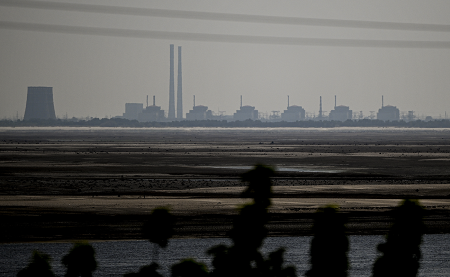"No one can solve this problem alone, but together we can change things for the better."
Drones Hit Zaporizhzhia Reactor Building
May 2024
By Kelsey Davenport
A drone strike on the Zaporizhzhia Nuclear Power Plant did not compromise safety and security at the site, but the attack represents a dangerous new stage in the Ukraine war, the head of the International Atomic Energy Agency (IAEA) warned on April 11.

IAEA Director-General Rafael Mariano Grossi reported during an emergency meeting of the agency’s Board of Governors that drones struck several buildings at the Zaporizhzhia nuclear complex on April 7, including a “direct hit on the reactor dome of Unit 6.” The attack is the first direct targeting of the Zaporizhzhia plant since November 2022, he said.
The drone strike resulted in minimal damage and “did not compromise nuclear safety in a serious way,” according to Grossi, who warned that the attack is “an ominous indication of an apparent readiness” to continue strikes on the facility “despite the grave dangers they pose to nuclear safety and security.”
Russia and Ukraine requested that the board meet after the April 7 strike on Zaporizhzhia and traded accusations over the source of the strike. Russia has occupied the plant illegally since the early days of its full-scale invasion of Ukraine. The board has called on Russia to withdraw from the facility and return control to Ukraine.
Mikhail Ulyanov, Russian ambassador to the IAEA, accused the agency of being “afraid” to say Ukraine was behind the attack. During a press briefing following the board meeting, he said that failing to accuse Kyiv is creating “an atmosphere” that “essentially encourages the Ukrainian side to commit reckless actions.” He expressed hope that there will be “no new attacks” on the complex and the opinion that “shooting at nuclear facilities is completely unacceptable.”
During the IAEA meeting, Ukraine accused Russia of deliberately creating threats to the nuclear security and safety of Zaporizhzhia.
Laura Holgate, U.S. ambassador to the IAEA, told the board that the United States condemns “all such actions regardless of who the culprit is,” but noted that the “root cause of all events threatening the safety and security of the Zaporizhzhia plant is Russia’s full-scale invasion of Ukraine and its forcible seizure” of the nuclear facility. She called on Russia to “unconditionally withdraw its military and civilian personnel” from Zaporizhzhia and return control of the nuclear facility to Ukraine.
The UN Security Council also met to discuss the drone strike.
Grossi told the Security Council on April 15 that the “attack sets a very dangerous precedent of the successful targeting of the reactor containment.” Other drones struck targets in “close proximity to the main reactor buildings and resulted in at least one casualty,” Grossi said.
Sergiy Kyslytsya, Ukrainian ambassador to the United Nations, called the drone strike a “well-planned false flag operation” by Russia. He dismissed arguments that Ukraine was behind the attack, saying that Kyiv would not risk creating another Chernobyl-like nuclear accident by attacking the facility. Only returning the Zaporizhzhia complex to “the full control of Ukraine” can guarantee nuclear safety, Kyslytsya said.
During the Security Council meeting, Robert Wood, the U.S. alternative representative to the UN for special political affairs, said that every member of the council should agree on the “fundamental point” that it is “imperative that we avoid a nuclear incident” at Zaporizhzhia.
Wood also raised concerns about Russia’s targeting of critical Ukrainian infrastructure, which “directly threaten[s] the stability of external power to the [nuclear] site.” He said this poses an “unacceptable nuclear safety risk.”
The IAEA team stationed at the Zaporizhzhia complex reported that the facility lost connection with its only backup power line on April 4. Reliable power is necessary to cool the reactors and for safety and security.
All six reactor units are now in cold shutdown, reducing the risk of a nuclear accident, but Russia has suggested that it will try to restart at least some of the units. It is not clear if Russia has the technical capacity and enough personnel to bring any of the reactors online.
